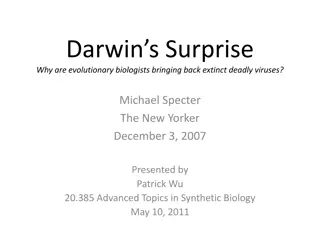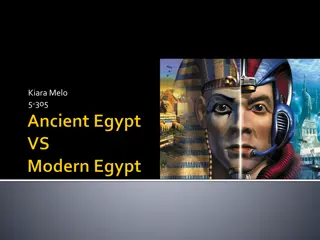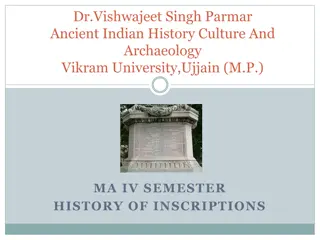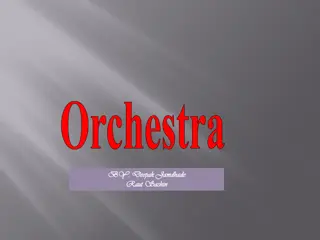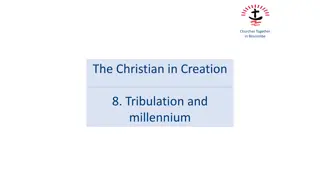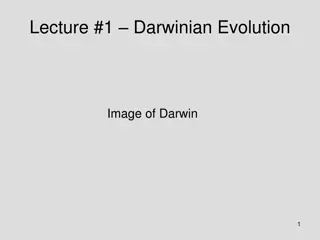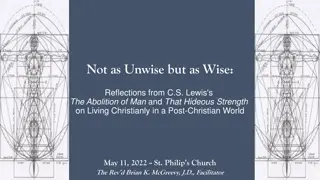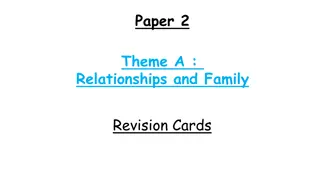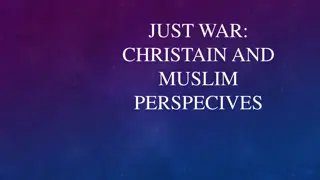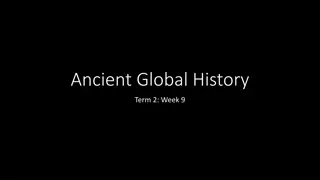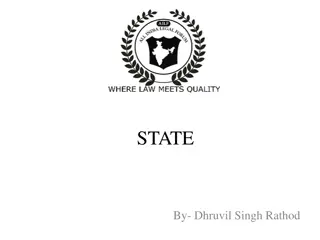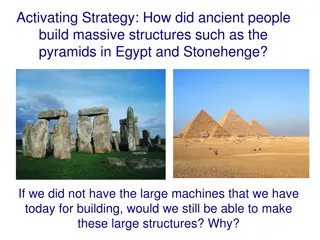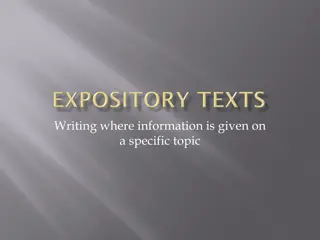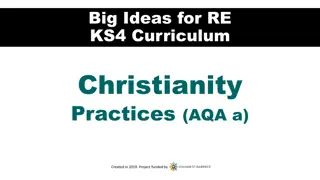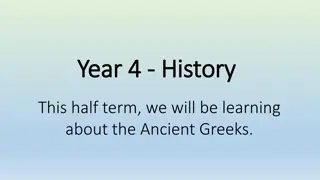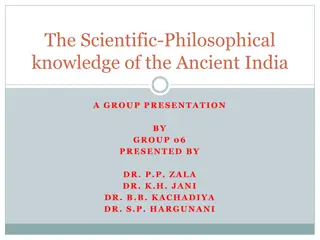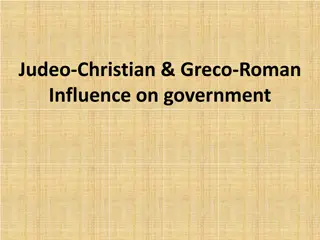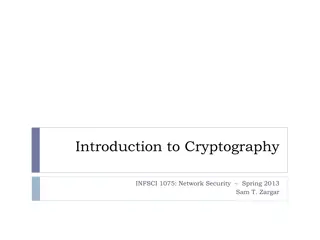Evolution of Christian Perspectives on History: From Ancient to Modern Times
Explore the rich tapestry of Christian perspectives on history, from the ancient civilizations of Assyria and the Jews, through the classical and medieval worlds, to the Renaissance and Reformation periods. Discover how Christian beliefs shaped historical narratives, emphasizing historicity, salvation history, and the fulfillment of prophecies through Jesus Christ.
Download Presentation

Please find below an Image/Link to download the presentation.
The content on the website is provided AS IS for your information and personal use only. It may not be sold, licensed, or shared on other websites without obtaining consent from the author. Download presentation by click this link. If you encounter any issues during the download, it is possible that the publisher has removed the file from their server.
E N D
Presentation Transcript
Christian Perspectives on History Dr. Susan Mobley November 21, 2014
A Brief History of History From Ancient to Modern
The Ancient World Assurnasirpal, King of Assyria, spoke: o 600 of their warriors I put to the sword; 3,000 captives I burned with fire; I did not leave a single one of them alive to serve as a hostage . . . . Their governor I flayed and his skin I spread upon the wall of the city; the city I destroyed, I devastated, I burned with fire. The Jews and History o Chosen People of God o The Covenant with God o Hebrew historical writing: purpose and meaning o History as linear and narrative
The Classical World Greeks and the invention of history o Histor to examine and evaluate accuracy of facts through inquiry o Herodotus, the father of history (484-425 B.C.) Facts Cause and effect Purpose of history History as Cyclical The Romans o Focused on military and political aspects, and biography o Narrative o Less concern for objectivity o Greater emphasis upon morality o Exempla
Christian View of History Christian emphasis upon historicity to establish authority o Old Testament as anticipation and preparation for Christ Augustine s City of God o History as linear, with a clear beginning, middle and end o Jesus Christ s life, death and resurrection as central events in the story o New Testament as the fulfillment of prophecies through Christ o The concluding triumph of the city of God over the city of man would result in the . . . . transcendence of believers beyond history into the realm of the eternal. Universal history
The Medieval World Annals and Chronicles of the Middle Ages o Impact of Augustine o Salvation history, but . . . . o History as linear and narrative o No attempt to draw connections between cause and effect o Reliance upon authorities rather than research
Renaissance and Reformation The Renaissance view of history o Tripartite division o Return to Classical models within a Christian framework o History as linear, but as exempla o Methodology The Reformation o Influences: Augustine and the Renaissance o History as polemic
The Modern World The Enlightenment o Emphasis on reason and secularism o Rejection of superstition and tradition o Revolt against institutional religion and religion itself o Expansion of historical inquiry o Fundamental flaw: polemical and anti-historical o Edward Gibbon s Decline and Fall of the Roman Empire Since the first discovery of the arts, war, commerce, and religious zeal have diffused among the savages of the Old and New World these inestimable gifts: they have been successively propagated; they can never be lost. We may therefore acquiesce in the pleasing conclusion that every age of the world has increased and still increases the real wealth, the happiness, the knowledge, and perhaps the virtue, of the human race.
Modernism Progressive views of humanity and historical process o Rise of modern science o Charles Darwin and the theory of evolution History under assault o Accusation that history as a discipline had failed in the development of verifiable methods o If historians could not express knowledge in approximate conformance with the mathematical ideal, then they had either indulged in a harmless but irrelevant enjoyment of confused perceptions or, much worse, embarked upon a dangerous error in the path of truth.
History as an Academic Discipline Historismus (historicism) o To comprehend the past, scholars had to enter into the mental universe of past actors empathetically and reconstruct their picture of reality. o Historians turned away from interpretation to the rigorous examination of the factual event, just as it occurred. Leopold von Ranke o History was not to judge the past in order to instruct the present for the benefit of future years. Historians should tell the story wie es eigentlich gewesen. o Transformation of history into a modern academic discipline, university based, archive bound and professional
Of all the factors which have operated to the disadvantage of religion and the undermining of the religious sense in recent centuries, the most damaging has been the notion of an absentee God who might be supposed to have created the universe in the first place, but who is then assumed to have left it to run as a piece of clockwork, so that he is outside our lives, outside history itself, unable to affect the courses of things and hidden away from use by an impenetrable screen.
Prevalent belief that the historical growth of freedom, whether conceived as propelled by natural necessity or by rational development, will gradually change the human situation, making man less and less a creature and more and more a master of the historical process. The usual basis for this hope is the belief that there is no essential difference between the stuff of history and the stuff of nature and therefore no real distinction between the application of the scientific method to nature and to history. So, the fulfillment of history will take place within history
Just the Facts History is a true story about the human past. --Paul Conkin The truth of history is gleaned from the collection and evaluation of historical facts. Sort of . . . . .
The Problem with Historical Facts Left to themselves, the facts do not speak; left to themselves they do not exist, not really, since for all practical purposes there is no fact until some one affirms it. Since history is not part of the external material world, but an imaginative reconstruction of vanished events, its form and substance are inseparable . . . It is thus not the undiscriminated fact, but the perceiving mind of the historian that speaks.
Order and Chaos If history could be told in all its complexity and detail it would provide us with something as chaotic and baffling as life itself; but because it can be condensed there is nothing that cannot be made to seem simple, and the chaos acquires form by virtue of what we choose to omit. Herbert Butterfield Historians must expose themselves to chaos while retaining a basic faith in order and meaning. --Lewis Spitz
History and Memory The most obvious definition of history is that it is a record or memory of past events. More profoundly considered it is a dimension of existence in which present realities can be rightly interpreted only through the memory of past events . . . . The memory of how things came to be prevents the present reality from appearing as an event of pure natural necessity. Memory is the fulcrum of freedom for man in history. That is why the study of history is an emancipating force in human life.
History and Memory There are two histories: the actual series of events that once occurred; and the ideal series that we affirm and hold in memory. The first is absolute and unchanged it was what it was whatever we do or say about it; the second is relative, always changing in response to the increase or refinement of knowledge. Selective Historical Memory o Example: The Declaration of Independence
The Historians Task Construction of events of the past o Collection and selection of facts Imposition of structure on disorder o Organization of the facts Meaning of the past is shaped by the present o Interpretation of the facts
The Meaning of History Do Christian historians work differently than non- Christian historians? o Yes and No Does history have a different meaning for Christians than for non-Christians? o Yes and No
Reinhold Niebuhr The drama of history is played upon the stage of time. All historical actions take place against the background of an inexorable forward movement from past to future. This flux of temporal events is a mystery beyond and behind the mystery and the meaning of history. . . . For time is both the stage and the stuff of history. Christian faith finds neither time nor history self- explanatory. The mystery of divine Providence gives meaning to history and the mystery of creation gives meaning to time.
Reinhold Niebuhr The Christian Gospel as the final answer to the problems of both individual life and man s total history is not proved to be true by rational analysis. Its acceptance is an achievement of faith, being an apprehension of truth beyond the limits of reason.
George Marsden The historical documents collected in the Bible provide the record of God s acting in history, and it is in the context of those acts, centering in the death and resurrection of Christ, that we must view ourselves and our world. The prominence of historical events as the basis of our faith suggests that in the Christian world- view the past has profound significance. . . . The Christian must view himself as participating in an on- going active relationship between God and man in which the revelation of God s acts and will in the past provides continuing norms for creative responses to the present.
George Marsden History is of major importance in alerting us to the transitory character of many of the values of our own age and culture. Rather than unknowingly allowing our values to be conformed to passing contemporary standards, we can strive to evaluate our current cultural norms intelligently and to apply to them the transforming values of Christ.
George Marsden The basic reason why we who are Christians should teach and learn history is so that we may better understand ourselves and our fellow men in relation to our own culture and to the world. Since the Christian s task is to live in this world and to witness to the love of God as manifested in Christ, it is essential for us to understand ourselves and the world as well as we possibly can. Love is the Christian s central obligation, and understanding is an essential ingredient in love. If we are going to love others, it seems evident that we should try our best to understand them.
Reinhold Niebuhr Christianity embodies the whole of history in its universe of meaning because it is a religion of revelation which knows by faith of some events in history, in which the transcendent source and end of the whole panorama of history is disclosed. Christian faith fully appreciates the threat of meaninglessness which comes into history by the corruption of human freedom. But it does not succumb to the despairing conclusion that history is merely a chaos of competing forces. It has discerned that the divine power which is sovereign over history also has a resource of mercy and love which overcomes the rebellion of human sin, without negating the distinctions between good and evil . . . The revelations of God in history, are, in fact, according to the biblical faith, evidences of a divine grace which both searches out the evil character of human sin and overcomes it.
Reinhold Niebuhr If, therefore, the New Testament faith ends in the pinnacle of the hope of the resurrection this is also the final expression of a faith which sees no hope that man may overcome or escape the contingent character of his existence; yet it is not without hope, for it is persuaded that a divine power and love have been disclosed in Christ, which will complete what man can not complete; and which will overcome the evil introduced into human life and history by man s abortive effort to complete his life by his own wisdom and power.
Reinhold Niebuhr The significance of memory as one aspect of what Christian thought has defined as the image of God in man was first given due appreciation in western thought by Augustine, who also first elaborated the sense of history, derived from Biblical thought. . . . Memory represents man s capacity to rise above, even while he is within, the temporal flux.
George Arthur Buttrick History is not a simple story. The historian s task is hardly begun when he writes, This happened. . . . . There are no bare facts: they come clothed in interpretation, and each writing of history gives them new garb. . . . Only in faith can history be construed. Faith in Christ is the clue to the meaning of history. But faith in Christ as the revelatory focus of history is never an easy faith, and the alienation of our time is not its major foe. The main trouble is that history itself seems to contradict it; that, indeed, history seems to contradict any pattern which our minds propose.
George Arthur Buttrick History is Dialogue, not between God and the Devil . . . . but between God and man. The teaching of history is dull because we have turned history into a monologue: man talking to himself. A monologue is always dull after the first few minutes. Soon it makes no sense. Then history becomes a recitation of successive dynasties, a deadly memorizing of kings and dates and battles. Humanist history has no depth. It is a flatland of man s doings . . . . History is the Dialogue between God and man in the language of event, and of the Event. History begins, continues, and ends in Mystery. It is equally appalling that we should think that we can print our patterns on history, our pathetic cycles, and our equally pathetic progress staircases, going where? Our patterns, like ourselves, are contingent and doomed to die.
Jaroslav Pelikan Unlike the firefly, history is not self-illuminating. The problem of the meaning of history is, therefore, not primarily a historical problem. Because the question is part of the problem of the meaning of human existence as such . . . an inquiry into the nature and destiny of history is necessarily an . . . intensely personal investigation. God s disclosure of His will for human life is twofold: it comes as law and as gospel, as judgment and as redemption. History is conceived of as Law whenever its development demonstrates the inability of men and civilizations to redeem themselves or to live up to the ideals and goals that they set for themselves.
Jaroslav Pelikan History is corrupted and in need of redemption . . . . The Law is not God s last word to men . . . His final self- disclosure is the Gospel of salvation. This salvation was historically wrought and can be historically realized. The Gospel is also the denunciation and renunciation of all human efforts to save history and of all trust in human ability to redeem historical process. History comes as Law whenever its movement demonstrates that man cannot achieve his own salvation. But it comes as Gospel when, in the Cross of Christ, it brings the message of God s favor and abiding love. This is the ultimate meaning of history and the last, best hope of earth.
Works Cited Butterfield, Herbert. The Art of the Historian (chapter 5) in The Whig Interpretation of History. Available in electronic format: http://www.eliohs.unifi.it/testi/900/butterfield/chap_5.html. Accessed 11-24-14. Butterfield, Herbert. Writings on Christianity and History. New York: Oxford University Press, 1979. Buttrick, George Arthur. Christ and History. New York: Abingdon Press, 1963. Cullen, Jim. Essaying the Past: How to Read, Write, and Think about History. Malden, MA: Wiley Blackwell, 2009. Gibbon, Edward. Decline and Fall of the Roman Empire. As excerpted in Primary Source Readings for HIST 103 Civilization and Worldviews History, ed. John Horgan and Susan Mobley. Mequon: Concordia University Wisconsin, 2007, 334-347. Gilderhus, Mark T. History and Historians: A Historiographical Introduction, 6thed. Upper Saddle River, NJ: Pearson Prentice Hall, 2007. Niebuhr, Reinhold. Faith and History: A Comparison of Christian and Modern Views of History. New York: Charles Scribner s Sons, 1949. Pelikan, Jaroslav J. History as Law and Gospel I. Cresset 4 (1949): 12-17. Pelikan, Jaroslav J. History as Law and Gospel II. Cresset 5 (1949): 19-23. Spitz, Lewis W. The Historian and the Ancient of Days. Reprinted in The Reformation: Education and History, 148-161. Variorum, 1997.



